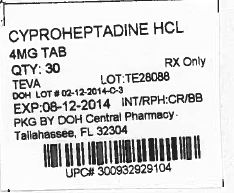Cyproheptadine Hydrochloride Tablet while Breastfeeding

What is Cyproheptadine Hydrochloride Tablet used for?
Cyproheptadine Hydrochloride Tablet while breastfeeding safe or not? Can there be any side effects for infant while using it during breastfeeding?

Nursing Mothers It is not known whether this drug is excreted in human milk. Because many drugs are excreted in human milk, and because of the potential for serious adverse reactions in nursing infants from cyproheptadine, a decision should be made whether to discontinue nursing or to discontinue the drug, taking into account the importance of the drug to the mother (see CONTRAINDICATIONS).
Cyproheptadine Hydrochloride Tablet Breastfeeding Analsys
Cyproheptadine hydrochloride while Breastfeeding
Low RiskIt is a first generation antihistaminic and piperidine drug with a moderately sedative effect. Follow-up for sedation and feeding ability of the infant. Bed-sharing is not recommended for mothers who are taking this medication.
Cyproheptadine Hydrochloride Tablet Breastfeeding Analsys - 2
Cyproheptadine hydrochloride while Breastfeeding
CAS Number: 129-03-3
Unless it is intentionally being used to lower maternal serum prolactin levels, cyproheptadine should be avoided during lactation because it may interfere with lactation, particularly in combination with a sympathomimetic such as pseudoephedrine or before lactation is well established. The nonsedating antihistamines are preferred alternatives.
What should I do if already breastfed my kid after using Cyproheptadine Hydrochloride Tablet?
Cyproheptadine Hydrochloride Tablet is in the category of low risk, if you have already used it then its not a big deal if health and behavior of baby is good. However your health care provider shall be aware of the fact that you have used Cyproheptadine Hydrochloride Tablet so you should inform him based on your convenience.
I am nursing mother and my doctor has suggested me to use Cyproheptadine Hydrochloride Tablet, is it safe?
Cyproheptadine Hydrochloride Tablet comes in category of low risk and if your doctor is aware that you are breastfeeding it should be ok to use
If I am using Cyproheptadine Hydrochloride Tablet, will my baby need extra monitoring?
Not much monitoring required while using Cyproheptadine Hydrochloride Tablet
Who can I talk to if I have questions about usage of Cyproheptadine Hydrochloride Tablet in breastfeeding?
US
National Womens Health and Breastfeeding Helpline: 800-994-9662 (TDD 888-220-5446) 9 a.m. and 6 p.m. ET, Monday through Friday
UK
National Breastfeeding Helpline: 0300-100-0212 9.30am to 9.30pm, daily
Association of Breastfeeding Mothers: 0300-330-5453
La Leche League: 0345-120-2918
The Breastfeeding Network supporter line in Bengali and Sylheti: 0300-456-2421
National Childbirth Trust (NCT): 0300-330-0700
Australia
National Breastfeeding Helpline: 1800-686-268 24 hours a day, 7 days a week
Canada
Telehealth Ontario for breastfeeding: 1-866-797-0000 24 hours a day, 7 days a week
